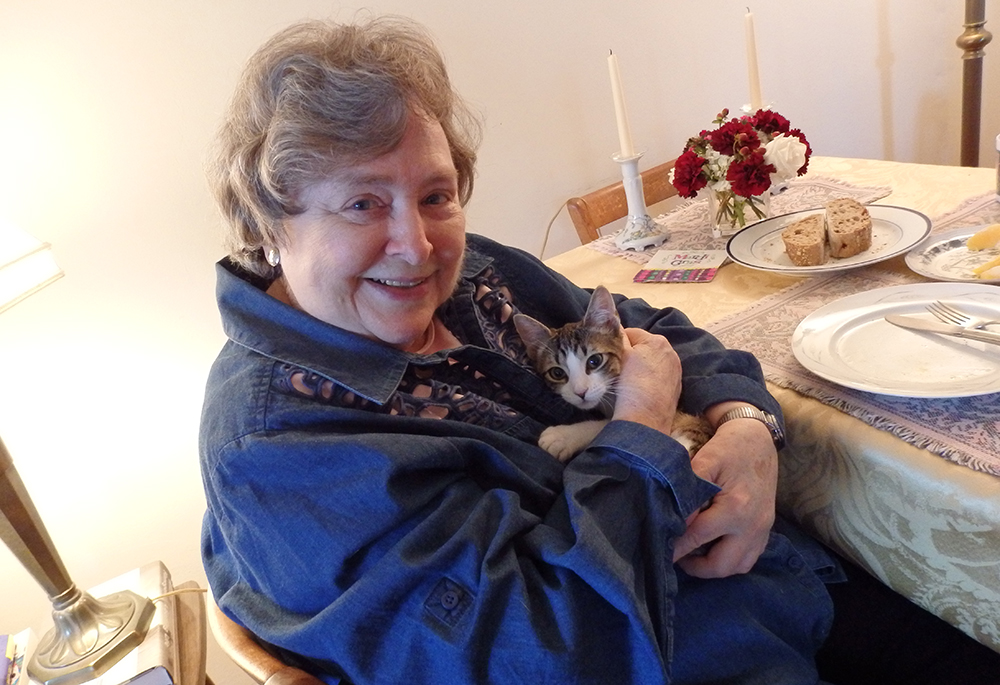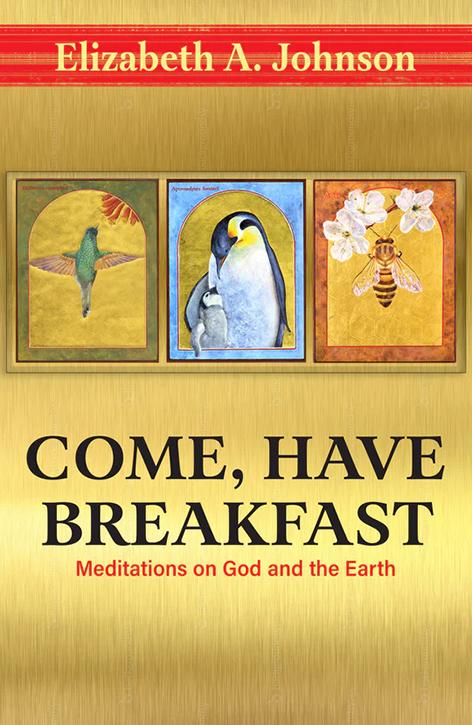
Elizabeth Johnson’s view of creation as a circle of kinship, rather than a hierarchy of being, means that yes, your dog or cat will go to heaven. She is pictured here with her cat Orion, named because "she is a constellation of beauty," Johnson says. (Courtesy of Elizabeth Johnson)
Elizabeth Johnson has spent her entire life — or at least her decadeslong theological career — trying to get people to think differently about God, beyond the patriarchal image of an authoritarian old man. Her award-winning 1992 book She Who Is is credited for bringing attention to the need for feminine images of the Divine.
Now Johnson is again broadening her view of God, in the hopes that it will help Christians see their connection to nature and the need to save it. Her new book, Come, Have Breakfast: Meditations on God and the Earth, explores God as a lover of the Earth who is in relationship with creation.
"We have this whole divide between body and soul, matter and spirit," Johnson told EarthBeat. "But God as creator brings in, in an organic way, everything that's material, that's bodily, that's made of flesh. That includes ourselves, sexuality, the need for food."
Johnson is a Sister of St. Joseph and one of the most prominent theologians in the United States, perhaps best known for the U.S. bishops' public criticism of her book, Quest for the Living God in 2011. In 2018, she retired from teaching at Fordham University and is now distinguished professor of theology emerita there.
Her new book's title refers to Jesus' words to the disciples during a post-Resurrection appearance near the end of John's Gospel. It reminded Johnson that Jesus enjoyed material things and was often taking care of people's material needs, like feeding them.
But why aren't there any paintings or churches named for the Jesus of Cooking Breakfast? The short answer: patriarchy.
"Who cooks breakfast for most people of the world? Still, it's women," Johnson said. "Here you have Jesus doing women's work, and that's why it doesn't get much attention."

Come, Have Breakfast by feminist theologian Elizabeth A. Johnson (Courtesy of Elizabeth Johnson)
But a God intimately involved in the material world has implications for how we treat it, Johnson said. It's why the book — which is a series of 30 meditations, each beginning and ending with a Scripture reference — is ultimately "a God book," as she says.
Taking care of creation is not just "one more issue" that can be seen as extrinsic to our own being, she said. Instead, it involves our understanding of God, of ourselves as made in the image and likeness of God, and of creation, which reflects the goodness of God.
With a vision of humans as part of a community of creation and of God in relationship to that community, environmental justice "is not just something you take up a collection for," she says.
Johnson also sees Jesus' death on the cross as "in solidarity not only with humans who die, but with every creature who dies, every single bird that falls to the ground."
Yet, for Johnson, it's not just the image of God and Jesus that need expansion but also how humans view their relationship to the rest of creation. The "hierarchy of being," which draws on Greek philosophical beliefs that divide the world into matter and spirit, ranking creation according to how much "matter" or "spirit" it has, is problematic, she says.
This hierarchy, which Christianity adopted, puts rocks at the bottom, followed by plants, then animals, then humans, then angels and finally God. These beliefs have led to humans seeing other creatures as having only instrumental value — only to be used — rather than intrinsic value.
Instead of a pyramid with humans near the top, Johnson sees a circle of kinship among the community of creation. "It's not leveling out differences [or] saying we're all the same. Clearly we're not," she said. "But we're fundamentally interrelated with each other. So when we care for the earth, we're not 'up here' caring for creation 'down there.' … We care for one another as members of the same community."
Advertisement
When asked if that means pets will go to heaven, she answers in the affirmative. "But I'm not just saying that; the Scriptures are saying that," she said, citing Romans 8: "that the creation itself will be set free from its bondage to decay and will obtain the freedom of the glory of the children of God."
She also quotes Pope Francis in "Laudato Si', on Care for Our Common Home," which affirms that "eternal life will be a shared experience of awe, in which each creature, resplendently transfigured, will take its rightful place."
"The idea is we're all going to be together," she said. "The fundamental notion is that God creates and loves all creatures, and finds the Earth and all the cosmos good. This God is not a throwaway God. When you love something, you cherish it and want it to flourish."
For Johnson, that love extends to her feline roommate Orion, named "because she is a constellation of beauty." She also finds beauty in nature in her native New York City, where she pays attention to trees, flowers, even the sky on her regular walks.
"New York is also a water city," said Johnson, who finds contemplative walks on the beach to be spiritual experiences.
She also points to the recent solar eclipse that prompted spiritual insights from many who observed it in areas of totality. "I'm not saying you have to go see an eclipse," she said. "But it's around us if we just open our eyes and look."
Yet Johnson acknowledges that environmental racism means some urban areas have less nature than wealthier neighborhoods. "There are efforts to name that problem and counteract it," she said. "But no matter where you live, you can get outside."
Johnson also encourages Christians to pay attention to biblical references to nature and creation, which can offer an alternative view of God to one of an authoritarian old man in the sky.
That patriarchal view is an "idol," Johnson said. "It's a false God, and it's turned a lot of people off."
'Everything we say about God is limited by our own finite experiences. God is infinite. So we have to keep breaking open our categories and letting our spirits soar into the actual mystery of God.'
—Elizabeth Johnson
Seeing God "as the creator spirit present in every living thing" might be more attractive to younger people, who increasingly are disassociating from institutional religion. "And older people too," adds Johnson.
In conversations with people who tell her they don't believe in God, Johnson often asks them to describe who they think God is. She often receives a response about a vague authority figure in the distance who dictates what they can and cannot do. "I end up saying, well, I don't believe in God either if that's what you mean by who God is."
She acknowledges the need for authority and for moral, ethical living, but too often our images of God are grounded in excessive authoritarianism — male authoritarianism — and other "problematic stuff that does not have to be there," she said.
In her retirement, Johnson didn't expect to write another book. But Scripture images of a broader notion of God prompted the reflections in Come, Have Breakfast.
"Everything we say about God is limited by our own finite experiences," she said. "God is infinite. So we have to keep breaking open our categories and letting our spirits soar into the actual mystery of God."






